

Łukasz Goik – born in Tarnowskie Góry, is a graduate of the Jagiellonian Univeristy in Cracow (Institute of Culture, Chair of Culture Management) and the Higher School of Banking in Poznań (faculty of Banking and Finance, major in European Studies and Financial Consulting).
He has been affiliated with the Silesian Opera since 2004, initially as an audience service employee and coordinator of artistic work, and since 2011 - as a deputy manager of events and advertisement department. In 2012 he became the deputy director of the Opera. In 2008 and 2012 he was the assistant of the Director of the 2nd International Adam Didur Opera Singers’ Competition. He supervised and coordinated the first co-production of the Silesian Opera, - the première of “Maria Stuarda” by . G. Dionizetti directed by Dieter Kaegi (i.e. the cooperation of three theatres (Teatr Wielki in Poznań, Teatr Wielki in Łódz and the Silesian Opera) .
In 2008 -2009 he worked as a financial consultant in Katowice and from 2009 he was the manager of branch office of “Phinance S.A.” where he organised and managed key project - the creation of the new customer service department and specialist department in Silesia. He participated in numerous trainings for managerial staff. He completed certified Centre of Financial Planning, he took part in numerous workshops and trainings in the field of culture (i.a. “Managing Cultural Institution”, “Manager of Culture” organised by Centre of European Law) and small and medium sized enterprises. He is a co-organizer of numerous events and projects outside of the regular repertoire of the Silesian Opera, incl. “Adam Sztaba & Oberschleisien symphonically with the Silesian Opera Orchestra” as well as charity events. He is actively involved in education projects both of the Silesian Opera as well as other educational institutions. He supports many associations and public benefit organisations.
In 2016 he was awarded the Honorary Gold Medal for working actively to promote the development of the Commercial Self-government (medal awarded by Industrial and Commercial Chamber in Tarnowskie Góry) and with Bronze Medal for his services aimed at promoting culture.

He is ranked among the most known and highly regarded dancers, choreographers and directors. He has been present on the theatre stage for over fifty years. His choreographic oeuvre includes almost all classical ballets, i.a. Swan Lake, Don Quichotte, Nutcracker, La Fille mal gardée, Harnasie, Romeo and Juliet and many performances of contemporary music staged on all the musical stages in Poland. He leant his profession in the State Ballet School in Warsaw. As a soloist dancer he debuted on the stage of Teatr Wielki in Poznań, as a choreographer he debuted in students theatre where he staged - together with Janusz Nuczak - the Polish première of Operetta by Gombrowicz. In 1971 Henryk Konwiński began cooperating with Napoleon Siess, then the director of the Silesian Opera , by preparing Walpurgis Night in Faust. He debuted on the Bytom stage as a choreographer with the balletCreation of the World, he also directed numerous operas, operettas and ballet performances, including Haunted Manor, Ernani, Madama Butterfly, Cosi fan tutte, Gioconda, Don Quichotte, Aida, Merry Widow and Orpheus and Eurydice. On numerous occasions he has been nominated and awarded “the Golden Mask” award and he has also received the Jan Kiepura Theatre Music Award in the category “the Best Choreographer” (2010), Gloria Artis silver medal (2011), Terpsichore statuette - special award of the Dance and Ballet Section of Polish Association of Stage Artists (2014), the Medal of the City of Bytom and the award of the Marshal of the Silesian Voivodeship in the filed of choreography and dance (2016).

A graduate of the Academy of Music in Katowice and the Postgraduate Studies in the field of Voice Emission of the Academy of Music in Bydgoszcz. She completed postgraduate studies in the Faculty of Organisation and Management of the Silesian University of Technology. She was qualified for adjunct in the Academy of Music in Warsaw as regards supervising vocal and vocal-instrumental bands. She is a professor at the Academy of Music in Katowice. She supervises numerous choirs and vocal bands. She is a co-author and artistic director of the “Musica pro Europa” International Musical Workshop. Her artistic output has been recorded and broadcast on radio and TV. She co-operates with many world known instrumentalists, vocalists and conductors. Her artistic work has been appreciated and she has received numerous prizes. She is a juror of choir competitions.

Soloist of the Silesian Opera ballet He is a graduate of the Ballet School in Bytom and of the Higher School of Skills in Kielce. He has been co-operating with the Silesian Opera since 1988. He danced all leading roles in such ballets as: Snow White (Prince), Coppelia (Franz), Nutcracker (Prince, Drosselmajer), Cindarella (Prince) , Pan Twardowski (Devil), Waltz dream (Boy), Ferdinand the Bull (leading role), Peter and the Wolf (Peter), Don Quichotte (Basil).


Franck Chastrusse Colombier graduated from the École Normale de Musique de Paris with major in Orchestra Conducting. He also received education in this area at Accademia Chigiana.
He was educated by Georges Prêtre (Teatro la Fenice, Opera de Paris et Orchestre National e France) and Maurizio Arena. At 22 he made his debut with Rigoletto in Orvieto which resulted in invitations to other productions, such as Traviata, Trovatore, Madama Butterfly, Barbiere di Siviglia. He also collaborated with the Massa Opera as an assistant conductor. He had the honor of assisting Alain Guingal (Opéra d’Avignon et Orchestre National d’Ile de France). Franck Chastrusse Colombier is a laureate of the European Union Young Conductors Competition and received the 1st Prize at the Luigi Mancinelli International Competition (2014). He had the honor of working together with such great artists as Leo Nucci (Théâtre des Champs Elysées) and Olga Borodina (Opera de Massy). He is a cocreator and the artistic director of the Opera Bus project at the Opera de Massy (a partner of which is the Erasmus programme). At 28 Franck Chastrusse Colombier became the artistic director of the Paris Symphony Association Orchestra being the youngest director in its history. He conducted Carmen in the Wrocław Opera, concerts at Opera de Massy (Concert Offenbach), also in Ireland (Die lustige witwe) and Shanghai (Beethoven concert).
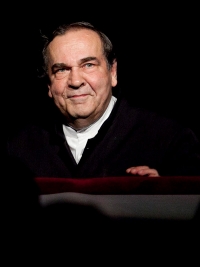
Absolwent Wyższej Szkoły Muzycznej im. Fryderyka Chopina w Warszawie na Wydziale Instrumentalnym (klasa waltorni – 1975) i na Wydziale Teorii, Kompozycji i Dyrygentury w klasie wybitnego dyrygenta – prof. Bohdana Wodiczki (1978).
Swoje umiejętności doskonalił w Weimarze na Mistrzowskim Kursie Dla Młodych Dyrygentów w klasie prof. Kurta Masura. Jako dyrygent debiutował w 1978 r. w Teatrze Wielkim w Łodzi prowadząc „Traviatę” G. Verdiego. Na tej scenie prowadził również takie przedstawienia, jak: „Cyganeria” G. Pucciniego, „Don Carlos”, „Otello” G. Verdiego, „Wolny strzelec” C. M.Webera, „Straszny dwór” St. Moniuszki.
W latach 1979-1981 pracował jako dyrygent w Operetce Warszawskiej. W 1982 roku podpisał kontrakt jako dyrektor artystyczny Orkiestry Symfonicznej w Bogocie (Kolumbia). Po powrocie do kraju pełnił funkcję dyrektora artystycznego Opery w Bydgoszczy, gdzie przygotował i prowadził takie premiery, jak: „Halka” St. Moniuszki, „Bal maskowy” G. Verdiego, „Kopciuszek” G. Rossiniego. W 1985 roku wyjechał na kontrakt do Turcji, gdzie był I dyrygentem Opery w Izmirze i zrealizował takie premierowe przedstawienia, jak: „Madama Butterfly” G. Pucciniego, „Napój miłosny” G. Donizettiego oraz balet „Copelia” L. Delibesa. W sezonie artystycznym 1987-1988 był kierownikiem artystycznym Opery i Operetki w Szczecinie, a w latach 1989-1993 – Operetki Warszawskiej, gdzie przygotował i dyrygował premiery: „Wesołą wdówkę” F. Lehara, „Życie Paryskie” J. Offenbacha, „Noc w Wenecji” J. Straussa i „Błękitną maskę” F. Raymonda. Z dwoma ostatnimi wielokrotnie występował w teatrach Niemiec i Holandii. W 1995 objął stanowisko dyrektora artystycznego Opery Bałtyckiej, gdzie zrealizował wiele znaczących premier: m. in. „Toscę” G. Pucciniego, „Cyrulika sewilskiego” G. Rossiniego, „Zemstę nietoperza” J. Straussa i „Wesołą wdówkę” F. Lehara. W Operze Śląskiej, z której zespołem w ostatnich latach wyjeżdżał na tournee z operami G. Verdiego: „Nabucco” (Niemcy) i „Rigoletto” (Francja), objął kierownictwo muzyczne nad premierowymi realizacjami musicali „Phantom” (2011) i „My Fair Lady” (2013). Brał również udział w nagraniu dwupłytowego albumu „Opera Śląska poleca – hity operowe i operetkowe” (2012). Od roku 1999 był dyrektorem artystycznym Teatru Muzycznego w Łodzi. Pod jego kierownictwem zespół łódzkiego Teatru Muzycznego wielokrotnie występował podczas tournee po Niemczech i Belgii, w tak prestiżowych miejscach, jak: Filharmonia w Berlinie, Deutsche Oper i Konzerthaus w Berlinie, Filharmonia w Monachium, Herkulessaaf w Monachium, Teatr w Wolfsburgu, Cirque Royal w Brukseli i wiele innych. Brał również udział w festiwalach w Polsce (Krynica, Sanok, Wrocław) i Niemczech (Klingenberg i Balve-Hoehle).
W 2004 roku dyrygował w Królewskim Teatrze de la Monnaie w Brukseli podczas galowego koncertu pod auspicjami Ministra Spraw Zagranicznych Włodzimierza Cimoszewicza, w którym wzięli udział Małgorzata Walewska, Dariusz Stachura i orkiestra Teatru Muzycznego w Łodzi. W roku 2006 zrealizował na specjalne zamówienie niemieckiej agencji artystycznej operę „Czarodziejski flet” W. A. Mozarta, którą dyrygował ponad 30 razy podczas kolejnego tournee teatru po Niemczech.
Współpracuje z większością filharmonii w Polsce. Pod jego batutą występowały takie gwiazdy, jak: Stefania Toczyska, Wiesław Ochman, Ryszard Karczykowski, Urszula Kryger, Marcin Bronikowski, Małgorzata Walewska, Paulos Raptis, Aleksandra Kurzak, Krystian Zimmerman, Janusz Olejniczak, Piotr Paleczny, Lidia Grychtołówna , Rinko Kobayashi, Konstanty Andrzej Kulka, Wadim Brodski, Bartłomiej Nizioł, Waldemar Malicki, Bogna Sokorska, Wanda Polańska, Grażyna Brodzińska i wiele innych.
Od 2009 roku związany stałą współpracą z Teatrem Muzycznym w Lublinie, gdzie pod jego kierownictwem muzycznym przygotowano spektakle: „Nabucco” G. Verdiego, „Karnawał zwierząt” C. Saint-Saensa, „Phantom” M. Yestona, operowe widowisko dla dzieci „Mały Czarodziejski flet”.
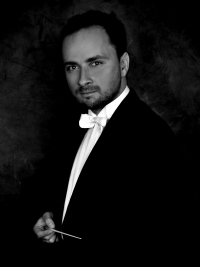
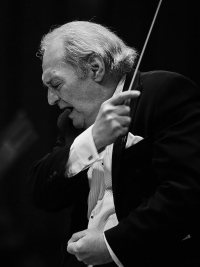



She graduated from the Karol Szymanowski Academy of Music in Katowice under the tutorship of Prof. Jan Ballarin and Ewa Biegas PhD.
A Ministry of Culture and Art stipendist.
She is a laureate of the International Ludomir Różycki Competition in Gliwice (Honorable Mention, 2003), Intercollegiate Slavic Vocal Music Competition in Katowice (Second Prize, 2006), H. Halska Competition in Wrocław (Second Prize, 2007), I. Godin Competition in Vrable in Slovakia (First Prize, 2007), Schneider-Trnavsky Competition in Slovalkia (First Sprize and Bratislava Opera’s Director Special Prize, 2008), 3rd International Andrzej Hiolski Vocal Competition in Kudowa Zdrój (First Prize, 2014), Ada Sari Competition in Nowy Sącz (Finalist, 2007) and Moniuszko Vocal Competition (two Special Prizes, 2013).
She participated in many masterclasses conducted by i.a. Christa Ludwig, Helena Łazarska, Izabella Kłosińska, Ingrid Kremling-Domański and Francisco Araiza, which resulted in an invitation to take part in a joint project with Verein Opera in 2010.
She made her debut as Orpheus in Ch. W. Gluck’s “Orpheus and Eurydice” in the Silesian Opera where she also performed as Jadwiga in St. Moniuszko’s “The Haunted Manor” and as Dorabella in W. A. Mozart’s “Cosi fan tutte”. She also sings the part of Czipra in J. Strauss’s operetta “The Gypsy Baron”.
She also collaborates with the Grand Theatre – National Opera, where she sang the part of Hannah in M. Weinberg’s “The Passenger” and Martha in P. Tchaikovsky’s “Jolanta”; Opera Nova in Bydgoszcz where she played the part of Laura in A. Ponchielli’s “Gioconda”, Kraków Opera, where she sang the part of Ninon in K. Penderecki’s “The Devils of Loudun” and Zofia in St. Moniuszko’s “Halka” and also Gliwice Music Theatre as Venus in J. Offenbach’s “Orpheus in the Underwold” and Mina in I. Kalman’s “Countess Maritza”.
In 2011 together with the National Polish Radio Symphony Orchestra she made a recording of the K. Szymanowski’s operetta “Lottery for Husbands or Fiancé No. 69”.
She also performs oratorio music (i.a. the music of Bach, Vivaldi, Mozart, Rossini) and vocal lyric music of Polish and foreign compositors.
She performs in Poland and abroad.

She graduated from the Academy of Music in Wrocław in 2001 with major in Vocal Performance under the tutorship of Prof. Agata Młynarska-Klonowska. She also completed two-year Vocal Master Postgraduate Studies with major in Opera with distinction. During her studies she used to perform opera and oratorio music in Poland and abroad, she sang as a soloist in such operas as: G. Puccini’s “Sister Angelica”, D. Cimarosa’s “Il matrimonio segreto”, G. Rossini’s “The Italian Girl in Algiers” and W. A. Mozart’s “The Magic Flute”. She also made recordings for radio and television. She was a finalist of the Second International Halina Halska Vocal Competition, she also participated at the 37th International Wratislavia Cantans Festival. In 2003 she made her debut in the Silesian Opera as Jadwiga in St. Moniuszko’s “The Haunted Manor”. Together with Wiesław Ochman she recorded a sacral music album “Ave Maria”. In May 2011 she was awarded with the Jan Kiepura Theatre Music Award in the “Best Female Singer” category.
She played such roles as: Dorabelli in “Cosi fan tutte”, The Third Lady in W. A. Mozart’s “The Magic Flute”, Cherubino in W. A. Mozart’s “The Marriage of Figaro”, Jadwiga in St. Moniuszko’s “The Haunted Manor”, Zofia in St. Moniuszko’s “Halka”, Carmen in G. Bizet’s “Carmen”, Marina in M. Mussorgsky’s “Boris Godunov”, Maddalena in G. Verdi’s “Rigoletto”, Fenena in G. Verdi’s “Nabucco”, Flora in G. Verdi’s “Traviata”, Amneris in G. Verdi’s “Aida”, Suzuki in G. Puccini’s “Madama Butterfly”, Olga in P. Tchaikovsky’s “Eugene Onegin”, Orlofsky in J. Strauss’s “The Flittermouse” and Mirabella in J. Strauss’s “The Gypsy Baron”. She performed in Austria, Germany, Switzerland, the Netherlands, France, USA and Egypt, where she performed as a soloist with a concert, oratorio and opera repertoire. In Poland she performed i.a. with the Warsaw Philharmonic, Silesian Philharmonic, Rzeszów Philharmonic, Jelenia Góra Philharmonic, Zabrze Philharmonic and Gdańsk Philharmonic.

She graduated from the Vocal and Acting Institute of the Academy of Music in Katowice in the class of Irena Lewińska in 1989. In 1989 she joined the Silesian Opera in Bytom as a soloist. She collaborated with the Warsaw Operetta, Silesian Philharmonic, Opole Philharmonic, Zielona Góra Philharmonic, Zabrze Philharmonic, Jelenia Góra Philharmonic, Toruń Philharmonic and many institutions organising concerts in the country.
She made multiple performances in Germany and the Netherlands. She performed in the Silesian Opera as Adela in “The Flittermouse”, Pamina in “The Magic Flute”, Frasquita in “Carmen”, Despina in “Cosi fan tutte”, Zerlina in “Don Giovanni”, Adina in “The Elixir of Love”, Fiodor in “Boris Godunov, Masha in “The Tsarevich”, Valencienne in “The Merry Widow” and Arsena in “The Gypsy Baron”.
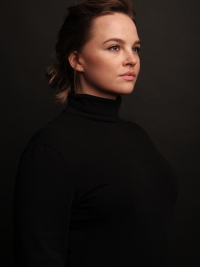

Strona Swietłany Kaliniczenko
www.kalinichenko.eu

She graduated from the Academy of Music in Gdańsk. She debuted as Paminy in W. A. Mozart’s “The Magic Flute” in Düsseldorf. In 1992 she joined the Silesian Opera in Bytom as a soloist. She made many significant performances, such as Donna Anna in “Don Giovanni”, Tatyana in “Eugene Onegin”, Cio-Cio-san in “Madama Butterfly”, Nedda in “Clowns”, Venus in “Tannhäuser”, Marina in “Boris Godunov”, Mimi in “La Bohème”, Boulotte in “Bluebeard”, Elisabeth in “Don Carlos”, Halka in “Halka”, Sylva in “The Csárdás Princess”, Rosalinde in “The Flittermouse”, Sonja in “The Tsarevich”, Eurydice in “Orpheus and Eurydice”, Maritza in “Countess Maritza” and Anna Glawari in “The Merry Widow”. She also participated in a very interesting project – the world premiere of a contemporary opera “Madame Eurosa’s Hysterical Museum” by Piotr Szmitke.
She often participates in the Silesian Opera’s concerts, not only as a soprano singer, but also as a host. She is appreciated by both the critics and the audience; she often gets calls from music lovers with words of congratulations and acknowledgement. For many years she has been taking part in the Silesian Opera’s foreign tournees to Germany, Italy, Netherlands, Belgium, France and Luxembourg promoting the culture of Poland, Silesia and primarily the city of Bytom and the Silesian Opera.
Aside from her everyday work Joanna Kściuczyk-Jędrusik eagerly undertakes various charity activities. After the fire in the Silesian Opera in 2000 she was invited by the “Most” foundation, together with several Silesian Opera’s soloists, to perform in a fund-raiser for rebuilding the burnt part of the Opera. The performance was organized in Kempen in Germany. She performed there several times together with the Silesian Opera’s artists at the invitation of the city government of Kempen representing the Silesian Opera and the city of Bytom. Silesian Opera maintains friendly relationship with the German city up till now. Joanna Kściuczyk-Jędrusik often performs in charity concerts for hospitals, organisations and disabled children centres and events like “Read Aloud Day” where local celebrities read fragments of books to the children. These are not one-time actions since she has never been indifferent to human harm and the needs of other people. The best proof is her participation in the photo shoot “The Women of Bytom – An Involved Portrait” in 2005.
In 1996 together with the brass orchestra of KWK Staszic she recorded an album with Silesian regional songs and in 2001 and 2002 together with three other artist from the Silesian Opera she recorded two albums with operetta hits “Play Me Your Melody” and “Wine, Women and Song”. Since she is a very energetic person seeking new artistic sensations she is often involved in quite interesting cultural projects. Together with Prof. Tadeusz Sławek and double-bassist Bogdan Mizerski she performs in an interesting and innovative performance “Life and Death of William Blake. An essay for voice and double-bass”. The performance is being shown in many theatres in Poland. This unusual kind of modern art that uses poetry, music, image and vocal interpretation which is a background for the lyrics got very positive reviews among critics and the audience.
Joanna Kściuczyk-Jędrusik is one of the leading soloist of the Silesian Opera. She has usually been cast in leading roles. She received a Silesian Voivode prize for young artists (1996). In 2005 she was nominated for the Marshal of the Silesian Parliament Award “Golden Masks” for the roles of Eurosa and Halka.


Since the beginning of her singing career she amazes not only with her great musicality, but also with a fascinating beauty of the sound of her Wagnerian soprano.
After graduating from the Academy of Music in Katowice she made her debut on the Silesian Opera’s stage in W.A. Mozart’s “The Magic Flute”. That’s where she created her excellent roles in “Tosca”, “La bohème”, “Gioconda”, “The Troubadour” and “Cavalleria rusticana”.
The artist successfully performs in Poland and abroad, i.a. in Germany, France, the Czech Republic, Austria, Denmark, Belgium, Switzerland, Mexico and Ukraine. Polish and foregin critics, besides the words of admiration for the beauty of Iwona Noszczyk’s voice, perpetually emphasize her great intuition and sensibility in creating roles.
In 1995 the artist performed at the National Opera in Prague as Santuzza in P. Mascagni’s “Cavalleria rusticana” which began her collaboration with that theatre.
A year later she joined the National Opera in Ostrava as a soloist. There, she created many great roles, i.a. Elisabeth in G. Verdi’s “Don Carlos”, Senta in R. Wagner’s “The Flying Dutchman”, Tosca in G. Puccini’s “Tosca”, Liza in P. Tchaikovsky’s “The Queen of Spades” and Princess Turandot in G. Puccini’s “Turandot”.
An outstanding vocal range, silky voice and great technique let Iwona Noszczyk sing the roles requiring a lower voice (Amneris, Fenena, Eboli) besides the soprano ones.
The artist also often gives concerts singing recitals and using the symphonic repertoire.

Aleksandra Stokłosa's webpage:
www.aleksandra-stoklosa.art.pl

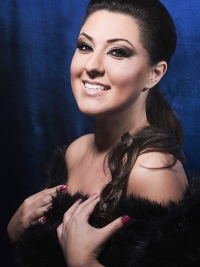
She graduated from the Vocal and Acting Institute of the Karol Szymanowski Academy of Music in Katowice with major in Vocal Performance under the tutorship of Prof. Jan Ballarin and Prof. Ewa Biegas. She acquired a diploma with distinction (G. Donizetti’s “Don Pasquale” – Norina). She improved her vocal skills during masterclasses conducted by Prof. Teresa Żylis-Gara and Prof. Helena Łazarska (International Summer Academy of Mozarteum University in Salzburg). She was Minister of Culture’s stipendist (2006, 2008). She also received a scholarship from the President of the City of Tarnów (2005). Since the 2009/2010 artistic season she is a Silesian Opera’s soloist where she performs such parts as: Musetta in G. Puccini’s “La bohème” (debut at the Silesian Opera), Hanna in St. Moniuszko’s “The Haunted Manor”, Lucy in Gian-Carlo Menotti’s “The Telephone”, Rosina in “The Barber of Seville”, Arsena in J. Strauss’s “The Gypsy Baron”, Gilda in G. Verdi’s “Rigoletto”, Zuzia in St. Moniuszko’s “Verbuum nobile”. She also collaborates with Opera Nova in Bydgoszcz (Musetta in G. Puccini’s “La bohème”). She performed at many festivals with bog opera and oratorio repertoire, i.a. W. A. Mozart’s “Coronation Mass” and “Litaniae Lauretanae”, G. Rossini’s “Stabat Mater”, F. Poulenc’s “Stabat Mater”, J. Elsner’s “Coronation Mass” and J. Haydn’s “Creation”. During the celebration of Henryk Mikołaj Górecki’s 75th birthday she performed the solo part of the Symphony No. 2 “Copernican”.
Ewelina Szybilska won the First Prize at the “Yamaha Music Foundation of Europe” Vocal Competition, Second Prize at the International Imrich Godin Vocal Performance Competition in Vrable (Slovakia) and the 4th National Iwona Borowska Operetta and Musical Music Performance Competition and was the finalist of the International “Klassik-Mania” Vocal Competition in Vienna.
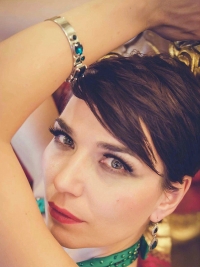
She graduated from the Vocal and Acting Institute of Fryderyk Chopin’s Academy of Music in Warsaw (the Singing class of Prof. Urszula Trawińska-Moroz) in 2003 with honors. She has been later improving her vocal skills under the supervision of Maestro Kałudi Kałudow. Her most important professional achievements include playing Tatyana in P. Tchaikovsky’s “Eugene Onegin” in the Grand Theatre – National Opera in Warsaw, participation in making G. Puccini’s “Turandot” (the role of Liu) during a tournée in Germany.
In 2009 she began her collaboration with the Silesian Opera in Bytom where she played Mimi in G. Puccini “La bohème”. Her roles of Cio-Cio-san in “Madama Butterfly” directed by H. Konwiński in 2010 in the Silesian Opera and Elisabeth in “Don Carlos” directed by W. Zawodziński got great reception. In 2012 she played the leading role in G. Puccini’s Tosca in the Silesian Opera. She also played this role six months later in the Grand Theatr in Łódź. Her newest role is the one in “Madama Butterfly” directed by Janina Niesobska, which is presented on the newly renovated scene of the Grand Theatre in Łódź. Anna Wiśniewska-Schoppa also collaborates with the Castle Opera in Szczecin, where she had the pleasure of working with director Pia Partum during the making of a modern staging of G. Puccini’s “Madama Butterfly”.
The artist participated in many singing masterclasses. She performes as a soloist during many chamber concerts in Poland and abroad.

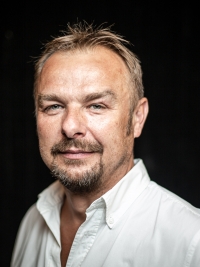
Maciej Komandera is a tenor (born March 4, 1972).
From 1991 to 1997 he studied at the Vocal and Acting Institute of the Academy of Music in Katowice and graduated with a Master’s degree. In 1998 he made his debut on the Silesian Opera’s stage as Góral in Stanisław Moniuszko’s Halka. During the next seasons he played i.a. Tamino in W. A. Mozart’s Die Zauberflöte, Borsa and Duke of Mantua in G. Verdi’s Rigoletto, Alfredo in G. Verdi’s Traviata, Manrica in G. Verdi’s Il trovatore, Radames in G. Verdi’s Aida, Don Carlos in G. Verdi’s Don Carlos, Walter in R. Wagner’s Tannhäuser, Lenski in P. Tchaikovsky’s Eugene Onegin, Jontek in St. Moniuszko’s Halka, Stefan in St. Moniuszko’s The Haunted Manor, Canio in R. Leoncavall’s Pagliacci, Turridu in P. Mascagni’s Cavalleria rusticana, Cavaradossi in G. Puccini’s Tosca and Pinkerton in G. Puccini’s Madama Butterfly. During his work in the Silesian Opera he was improving his skills at masterclasses conducted by Kałuda Kałudow and Aleksandra Teliga. From 2003 to 2005 he began his collaboration with the Cracow Opera where he performed as Caravadossi in G. Puccini’s Tosca, Pinkerton in G. Puccini’s Madama Butterfly, Polione in V. Bellini’s Norma and Stefan in St. Moniuszko’s Tha Haunted Manor.
He collaborates with many opera theatres in Poland and abroad: Baltic Opera in Gdańsk (Ernani, Tosca, Madama Butterfly), Opera Nova in Bydgoszcz (Tosca), Varna Opera in Bulgaria (Traviata, Il trovatore), Stara Zagora Opera in Bulgaria, Opera Constanta in Romania (Il trovatore) and art agencies: Bulcanto, Compania d’Opera Italiana di Milano, Supierz Artist Management and K-Promotion Michael Kmoch.
He improved his acting skills under the guidance of Wiesław Ochman, Laco Adamik, Robert Skolmowski and Marek Weiss-Grzesiński.

He graduated with honors from the G. and K. Bacewicz Academy of Music in Łódź, Julliard School and opera studio at the Metropolitan Opera in New York. He is a winner and a laureate of international vocal competitions, such as BBC Cardiff Singer of the World, Giacomo Puccini International Competition, Marcella Sembrich International Competition, Giullo Gari Competition, International V. Dunne Vocal Competition, International G. Lissner Vocal Competition and Ada Sari Vocal Competition. He performed on opera stages in the USA, Italy, Germany, England and Austria. He gave vocal recitals in Carnegie Hall (USA) and Wigmore Hall (England). In Poland he sang arias in Die Zauberflöte, La damnation de Faust, The Haunted Manor, La bohème and The Magic Mountain. In 2015 he was nominated for the Paszport Polityki Award and in 2016 he received the Polish President’s Medal for the Best Opera Debut.

He comes from Ivano-Frankivsk (Stanyslaviv) in Ukraine where he graduated from the Vocal Institute of the Art Academy. He received the Grand Prix at the 21st Century Vocal Competition in Lempala in Finland (2006), 3rd Award at the International Ada Sari Vocal Art Competition in Nowy Sącz (2011), Grand Prix and 1st Award at the International Adam Didur Opera Singers’ Competition in Bytom.
He collaborates with the most important opera theatres and philharmonics in Poland and abroad where he sings the main parts in Eugene Onegin and Don Giovanni, Miecznik in The Haunted Manor, Janusz in Halka, Marcello in La bohème, Figaro in The Barber of Seville, Sir Ford in Falstaff, Lord Ashton in Lucia di Lammerrmoor, Sharpless in Madama Butterfly, Count Almaviva in Le nozze di Figaro and Prince Yeletsky in La Dame de Pique in the Bolshoi Theatre in Moscow.
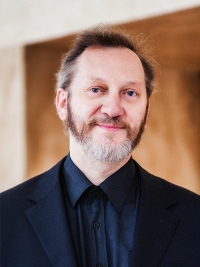
Born in 1956 in Częstochowa.
From 1974 to 1978 a student of the School of Music in Częstochowa in the Vocal Performance class of Anna Porwik-Pniok.
In 1984 he graduated from the Academy of Music in Warsaw with major in Vocal Performance in the class of Prof. Edmund Kossowski. From 1986 to 2001 he was improving his vocal skills under the guidance of Sławomir Książek.
He made his opera debut as Don Alphonse on the scene of the Great Theatre in Warsaw in 1982.
In the 1983/1984 season he was a soloist of the Bydgoszcz Opera.
/JUPITER, SKOŁUBA, CHORĄŻY/
Since 1984 he is a soloist of the Silesian Opera in Bytom.
/SKOŁUBA, BASILIO, GREMIN, STOLNIK, SIMONE, SPARAFUCILE, ZACCARIA, SARASTRO, IL MAESTRO, UBERTO, COLLINE, VOYEVODA, CAMP COMMENDANT, FERRANDO, FRANK, MÉPHISTOPHÉLÈS, AL WISE, ZSUPÁN, COMMANDER, SAINT PETER, RAMFIS, GUŚLARZ, OLLENDORF.
From 1991 to 1995 he collaborated with the Warsaw Chamber Opera.
/OSMIN, BARTOLO, COMMANDER/
From June to September 1991 he performed in the Vienna Kammeroper and went on tour to Japan and Korea in October and November 1991.
/COMMANDER/
From 1993 to 1995 he was a soloist of the Great Theatre in Łódź.
/SKOŁUBA, STOLNIK, MÉPHISTOPHÉLÈS, RAMFIS, DALANDT, COLLINE, SAMUEL, GALICKI, PASQUALE, FERRANDO, DULCAMARA, ZACCARIA, SPARAFUCILE/
From 1995 to 1998 he was a soloist of the Great Theatre in Poznań.
/ZACCARIA, PEDAGOGUE, SKOŁUBA, BASILIO, BARTOLO, FERRANDO, LAZAR, VARLAAM, SZÓSTAK, GUARDIANO/
He collaborates with opera theatres in Szczecin and Cracow and also with a Swiss and German groups performing on scenes and at concert halls all around Europe.
Since 2003 he is a soloist of the Narodne Divaldo Morawskosleske in Ostrava.
/GALITSKY, ZACCARIA, SARASTRO, DIED MOROZ, DULCAMARA, VODNIK, BANCO, FOTIS, DON ALFONSO/
In 1999 he played the role of Porgi on the scene of Gliwice Theatre in a performance based on Gershwin’s music.
He sang over 60 opera and operetta parts, over 20 oratiorio parts and 200 songs.
He performed over 1500 times in Poland and abroad: Germany, France, Great Britain, Spain, Italy, Austria, Switzerland, Ireland, Netherlands, Belgium, Luxembourg, Denmark, Sweden, Greece, Cyprus, Yugoslavia, Czech Republic, Lithuania, Ukraine, Japan, Korea.
He was a finalist of vocal competitions in Krynica (1984), Warsaw (1984), Barcelona (1989) and Bregenz (1991).
He performed at the world premiere of Mikis Theodorakis’ opera Elektra in Luxembourg in 1995 and in the Polish premiere of Domenique Probst’s Maximilian Kolbe in Bytom in 1990.
Since 1996 he runs an artistic agency organizing performances of popular and sacral music.
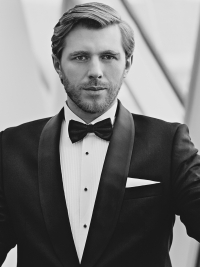
He comes from Chorzów. He graduated from the Academy of Music in Cracow under the tutorship of J. Borowicz and the Academy of Music in Katowice under the tutorship of R. Danel. From 2011 under the guidance of Prof. H. Łazarska. He is a Cracow Opera’s soloist. He made his debut as Alfredo in Traviata in the Silesian Opera, where he also performed as Lensky in Eugene Onegin and Rodolfo in La bohème. He plays the parts of Romeo in Romeo and Juliet and Alfredo in Traviata (both directed by Michał Znaniecki). He played many main parts, such as Nemorino in L'elisir d'amore, Barinkay in Der Zigeunerbaron, Tamino in Die Zauberflöte, Nadir in Les pêcheurs de perles, Ernesto in Don Pasquale. He also made many concert and oratorio performances in Poland and abroad and various recordings (S. Moniuszko’s opera Paria, soundtrack to Music, War and Love together with the National Polish Radio Symphony Orchestra). He received a Golden Mask Award for the vocal-acting role in Romeo and Juliet.

Wiesław Ochman is a tenor. For over 50 years he has been performing at the biggest opera theatres in the world. Before he made his life choice, he studied at the Ceramics Institute of the AGH University of Science and Technology from 1954 to 1960 and received a Master of Engineering Degree. During his studies he has been improving his vocal skills under the guidance of Gustaw Serafin. After joining the Silesian Opera he was improving his vocal performance abilities under the guidance of Maria Szłapak.
He made his debut at the Silesian Opera as Muezino in Ludomir Różycki’s Casanova and then played Edgar in Gaetan Donizetti’s Lucia di Lammermoor. During the next season he sang i.e. parts of Stefan in Stanisław Moniuszko’s The Haunted Manor, Nadir in George Bizet’s Les pêcheurs de perles, Lionel in Friedrich von Flotow’s Martha and Max in Carl Maria von Weber’s Der Freischütz. In the 1963/64 season he performed in the Cracow Opera where he played Cavaradossi in Giacomo Puccini’s Tosca and The Young King in Karol Szymanowski’s Hagith. In 1964 he performed in the Grand Theatre in Warsaw as Jontek in Stanisław Moniuszko’s Halka, Doctor Faust in Charles Gounod’s Faust, Don José in Georges Bizet’s Carmen and Cavaradossi in Giacomo Puccini’s Tosca. In the 1966-68 period he started his international career. Since then he performs regularly on the biggest opera scenes in the world, i.a. La Scala in Milan, Metropolitan Opera in New York and opera theatres in Barcelona, Berlin, Buenos Aires, Chicago, Hamburg, Madrid, Moscow, Paris, Rome, Salzburg, San Francisco, Sevilla and Vienna. He participates in the most prestigious music festivals accompanied by orchestras conducted by the most outstanding conductors.
He made many radio recordings, he also recorded over fifty albums for renowned labels with parts in such masterpieces as Richard Strauss’s Salome, Wolfgang Amadeus Mozart’s Requiem and Idomeneo conducted by Karl Böhm, Antonín Dvořák’s Stabat Mater, Ludwig van Beethoven’s Symphony no. 9 conducted by Rafael Kublik (DG), Wolfgang Amadeus Mozart Missa Solemnis in C minor together with Claudio Abbado, Leoš Janáček’s Jenufa conducted by Charles Mackerras (Decca), Sergei Prokofiev’s War and Peace conducted by Mstislav Rostropovich (Erato).
Charity work was an important part of Wiesław Ochman’s activity. In 1998 on the occasion of Adam Mickiewicz’s 200th birthday the artist gathered the works of Polish painters; they were then put up on auction in the Polish Consulate General in New York. The whole revenue was used to renovate the Adam Mickiewicz Museum in Vilnius. There, on March 7th 1999, Ochman gave a recital preceding another auction of paintings collected by the artist for “Our Częstochowa” Association. The collected funds were donated to scholarships and art support initiatives. The Silesian Opera has also received considerable amounts. Since 1993 Wiesław Ochman has also been doing his charity work as an artistic director and a performer at yearly “Wiesław Ochman and his guests” concerts in Zawiercie. The whole revenue was being donated to the Foundation for the Zawiercie’s Hospital “Auxilium”. After 1999 Wiesław Ochman also began directing. He directed Wolfgang Amadeus Mozart’s Don Giovanni, Giuseppe Verdi’s Traviata, Franz Lehar’s Der Zarewitsch, Pyotr Tchaikovsky’s Eugene Onegin, Modest Mussorgsky’s Boris Godunov, Georges Bizet’s Carmen and Stanisław Moniuszko’s The Haunted Manor.
Painting is another one of Wiesław Ochman’s artistic passions. The artist has made over 70 exhibitions. He is a laureate of the Second Degree State Prize (1973) and Cracow City’s Prize (1976). In 1977 the Mayor of Warsaw awarded Wiesław Ochman with a Medal of 400 Years of the Capital City of Warsaw and the Polish President honored him with Commander's Cross with Star of the Order of Merit of the Republic of Poland. He is an honorary citizen of Bytom, Zawiercie and Zelów and received the Order of the Smile. He is a member of the Polish Academy of Learning and received an honorary doctoral degree of the AGH University of Science and Technology and I. J. Paderewski Academy of Music in Poznań. A roundabout in Zawiercie has been named after him.
For many years Wiesław Ochman was the Chairman of the Silesian Opera’s Programme Council. He always felt and feels connected with this theater in particular. There he made his debut and began his great artistic career. In September 2013 he was the artistic director and a pedagogue at the First Academy of Vocal Art in the Silesian Opera in Bytom.


Born on December 26th 1980 in Kielce. He graduated from the Karol Szymanowski Academy of Music in Katowice under the tutorship of Prof. Alicja Słowakiewicz-Wolańska. In 2004 he joined the Gliwice Music Theatre. From 2005 to 2007 he worked at the Music Theatre in Lublin. He joined the Cracow Opera where he performed as Darly in the world premiere of Karol Szymanowski’s operetta Lottery for Husbands. He won many prizes at competitions and festivals such as: 2004 – he participated in a TV Performance during European Jan Kiepura European Festival in Krynica Górska, 2006 – 4th award at the 2nd National Iwona Borowicka Operetta Competition in Cracow, 2008 – Honorable Mention and 4 prizes (including the Best Tenor Award) at the Second International Adam Didur Opera Singers Competition in Butom. 2008 – Second Prize at the 3rd National Iwona Borowiecka Operetta Competition. In May 2009 Adam Sobierajski got the Third Prize at the 1st European Tenors Competition in Sosnowiec. He collaborates with the Grand Theatre in Poznań, Silesian Opera in Bytom, Music Theatre in Lublin, Silesian Philharmonic, Zabrze Philharmonic, Kielce Philharmonic and Toruń Philharmonic.
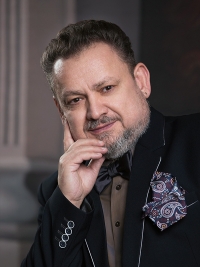
Aleksander Teliga is an outstanding Polish opera singer who ranks among the world’s best bass voices. He graduated from the Vocal and Acting Institute of the M. Lysenko Conservatory in Lviv. Since 1989 he works and lives in Poland. He sang such parts as Zaccaria in Nabucco, Philippe in Don Carlos, Silva in Ernani, Ramfis in Aida, Banco in Macbeth, Scarpia in Tosca, Méphistophélès in Faust, Escamilio in Carmen, Dikoj in Katia Kabanova, Vodnik in Rusalka, Boris in Boris Godunov, Tsar Dodon in Zolotoy petushok, Griemin in Eugene Onegin, General in Prokofiev’s The Gambler, Boris Timofeyevich in Shostakovich’s Lady Macbeth of the Mtsensk District.
He performed at i.a. the Staatsoper-Berlin, Opera Dortmund, The Royal Danish Opera House Kopenhaga, Opera Lyon, Opera de Monte-Carlo, Grand Teatro del Liceu in Barcelona, Royal Theater in Dublin, Teatro dell’ Opera di Roma, Teatro Communale w Bologna, Gran Teatro la Fenice in Venice, Opera Nacional de Mexico, Teatro Santiago de Chile, National Opera – Grand Theatre in Warsaw, Grand Théâtre de Genève, National Finnish Opera, Teatro Colon in Buenos Aires.
One of his biggest achievements was his participation in 6 productions of La Scala and 4 production of Bolshoi Theatre in Moscow.
He made performances together with world famous opera singers such as D. Dessi, D. Schellenberger, E. Obrazcova, D. Hvorostovskiy, F. Furlanetto, P. Gavanelli, G. Bartolini, M. Kwiecień. He collaborated with such acclaimed conductors and directors as i.a. D. Barenboim, Y. Temirkanov, D. Gatti, G. de Bozio, B. Herzl, S. Guadanio. V. Yurowsky, V. Sinajskij, A. Vierdernikov and Kazushi Ono. He made CD and DVD recordings abroad. In 2013 he participated in recording Stanisław Moniuszko’s Verbum Nobile for DUX Publishing House; the recording received a prestigious International Cassical Music Award. In 2015 in the Bolshoi Theatre in Moscow he made a recording of L. Diestiatnikov’s Rosenthal’s Children for Sony Classical Records.
He received many awards from ZASP and Ministry of Culture and National Heritage. In 1991 he received a Golden Mask for the role of Silva in G. Verdi’s Ernani. In 1993 he received a Golden Mask for the role of Méphistophélès in Charles Gounod’s Faust.
In 2003 he finished his PhD thesis at the Karol Szymanowski Academy of Music in Katowice. In 2005 he opened the first Private Opera School in Poland. In 2007 he inaugurated the Gloria European Music Festival. In 2009 he received an Arion Award from ZASP for outstanding achievements. Since 2005 he teaches at the Department of Instrumental and Educational Studies of the Fryderyk Chopin University of Music in Bialystok.
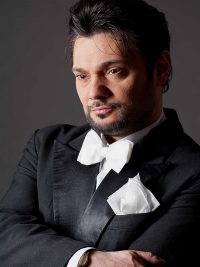
Juliusz Ursyn-Niemcewicz was born in Gliwice where he took his first singing lessons from Prof. Jan Ballarina. He graduated from the Academy of Music in Warsaw under the tutorship of Prof. Krystyna Szczepańska. He soon began giving concerts on a regular basis as a soloist both in the country and abroad – Austria, France, Spain, Belgium, Germany. He was a stipendist of music universities in Losanne and Geneva, he participated in masterclasses conducted by Prof. Jean C. Auber and Prof. P. Lisicjan.
He joined the Silesian Opera in 1995 where he made his debut as Canio in Leoncavallo’s I Pagliacci. That’s where he created many meaningful roles, such as Jontek in Halka, Pinkerton in Madama Butterfly, Offenbach’s Barbe-blue, Enzo Grimaldo’s Gioconda, Edwin in Die, Csárdásfürstin, Grigoriy in Boris Godunov, Alfredo in Traviata, Camil in Die Lustige Witwe. He also performed in Europe. He made his foreign debut as Cavaradossi in Puccini’s Tosca. He won the casting for the role competing against 120 tenors from all over the world. He also sang the part of Cavaradossi in the Berlin Opera and Neubrandengurg in the unconventional Christian von Goetz’s staging. After his successful performance in Tosca he took part in another casting for the role of Prince in Rigoletto. He won again; the premiere took Place in the Potsdam Opera in 2002 and was directed by Manfred Straube. He also sang this part in theatres in Hannover, Dusseldorf, London and Naples.
He also made many recordings for the Polish Television, including Wojciech Kilar’s The Grey Mist in collaboration with the National Polish Radio Symphony Orchestra conducted by Antoni Wit, Ramirez’s Misa Criolla. He also performed Fryderyk Chopin’s songs together with Wojciech Świtała. That performance opened i.a. the Chopin Year in London in 1999, it was witnessed by British Queen Elizabeth II. Juliusz Ursyn-Niemcewicz’s career was also the topic of varius TV programmes created by TVP3.
He often gives concerts with Polish philharmonic orchestras, he was a regular guest of Bogusław Kaczyński’s gala during many editions of Jan Kiepura Festival in Krynica-Zdrój. On many occasions he performed in the USA and Canada (New York, Toronto, Chicago, Ontario) giving opera music concerts.
He also collaborated with the Great Theatre – National Opera in Warsaw on a regular basis.
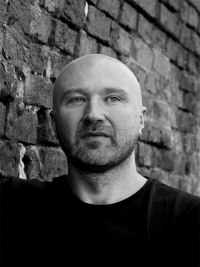
He graduated from the F. Nowowiejski Academy of Music in Bydgoszcz (the class of Prof. J. Greszta. He made his debut on the scene of the Great Theatre in Poznań as Zbigniew in The Haunted Manor. He is a soloist of the Silesian Opera in Bytom; he also collaborates with i.a. Opera Nova in Bydgoszcz, Baltic Opera, Podlasie Opera and Philharmonic and Czech Opera in Prague. He sang many main parts, such as: Scarpio in G. Puccini’s Tosca, Barnaba in A. Ponchelli’s Gioconda, Rodrigo in G. Verdi’s Don Carlos and Nabucco in G. Verdi’s Nabucco. In 2013 he made his debut at the Wagner Festival in Bayreuth performing Wotan’s monologue from Die Walküre and The Dutchman / Senta duet from The Flying Dutchman.

Born in 1968. He began his career in the State Folk Group of Song and Dance “Mazowsze”. He made his opera debut as Bard in Krakowiacy i Górale (directed by Krzysztof Kolberger) in 1991 in the Great Theatre in Warsaw. In 1992 he played the main part of Antonio in Tides and Waves musical at the Cultural Olympiad in Barcelona. From 1993 to 1996 he was a soloist of the Szczecin Opera and Operetta and Opera “Nova” in Bydgoszcz. In 1996 he joined the Silesian Opera as a soloist.
Among his essential roles are Zbigniew in The Haunted Manor, Alvise in Gioconda, Sarastro in Die Zauberflote, Leporello in Don Giovanni, Gremin in Eugene Onegin, Hermann in Tannhauser, Ramfis in Aida, Boris Godunov in Boris Godunov, Tonio in I Pagliacci, Escamillo in Carmen and Raimond in Lucia di Lammermoor. He also performed as Zaccaria in Nabucco for over 120 times during the Silesian Opera’s tournee in the West Europe. He collaborates with the Cracow Opera.

He began his music education in the class of violin in the National I. J. Paderewski Music School in Tarnowskie Góry. In 2007 he won the First Prize at the Amateur Vocal Competition Silesian Singing organized by Śląsk Dance and Song Ensemble. He began his vocal studies in 2008 in the Karol Szymanowski Academy of Music in Katowice in the class of Prof. Jan Ballarin (Vocal-Instrumental Department). He graduated in 2013. He participated in masterclasses conducted by Wiesław Ochman, Daniel Weeks and Ryszard Karczykowski. In a student performance of the Vilnius version of Stanisław Moniuszko’s Halka. He sang the part of Jontek. He participated in the 3rd and 4th International Adam Didur Opera Singers Competition in Bytom and the 1st International Andrzej Hiolski Vocal Competition in Kudowa Zdrój.
He made his debut as Cascada in a F. Lehar operetta Die lustige Witwe on the scene of Gliwice Music Theatre. In the Silesian Opera he sings the parts of Ottokar in J. Strauss’ operetta Der Zigeunerbaron, Fred in F. Loewe’s musical My Fair Lady, Dancair in G. Bizet’s Carmen, Schaunard in G. Puccini’s La bohème. He also collaborates with the Silesian Philharmonic, Zabrze Philharmonic, Warmia and Mazury Philharmonic. He performed at the R. Moreno Rathgeb’s Requiem for Auschwitz concert (conducted by Riccardo Sahiti) dedicated do the victims of Holocaust.
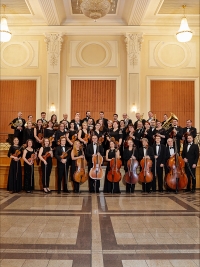
1st violin
Agata Maśnica (concertmaster), Jan Knapik (concertmaster), Dobrochna Bagniewska, Anna Śliwczyńska, Lilianna Janusz, Karolina Korelus, Weronika Sidorska, Jacek Głogowski, Ewa Doleżych (collaboration)
2nd violin
Małgorzata Orzińska, Iwona Mocała, Aleksandra Kasperek, Roksana Myślińska, Grażyna Kwiatkowska, Monika Wrzos (collaboration)
Violas
Barbara Księżyk (concertmaster), Łukasz Unger, Barbara Kostka, Weronika Milik, Krzysztof Gwóźdź
Cellos
Adam Markwica (concertmaster), Nikol Latocha (koncertmistrz), Maria Kubisa, Jaroslav Popov, Agnieszka Bator-Skowrońska, Agnieszka Majchrzyk (collaboration)
Double-basses
Stanisław Rymarczyk (I głos), Szymon Ręczmin, Piotr Kucharz
Harp
Marta Gargas-Borowy, Elżbieta Baklarz (collaboration)
Flutes
Małgorzata Bugiel (I głos), Tacjana Czech (I głos), Marta Gaweł-Nowak, Dominika Łysik
Oboes
Gabriel Koszela (I głos), Klaudiusz Sowa (I głos), Sebastian Wizner (I głos)
Clarinets
Marian Bugdoł (I głos), Dariusz Jursza (I głos), Katarzyna Pala, Dominika Kubicka (collaboration), Marian Tobor (collaboration)
Basoons
Cezary Kowalski (I głos), Julia Ilczuk, Kasper Lechowski
Horns
Igor Czaban (I głos), Alina Pietrzak, Jadwiga Surtel, Kamil Wieczorek (collaboration)
Trumpets
Jacek Król (I głos), Kornel Wieczorek, Mateusz Kisielnicki, Łukasz Mruczek
Trombones
Roman Chrząścik (I głos), Dawid Guzy (I głos), Robert Waloszczyk, Piotr Sotniczuk
Tuba
Karol Mueller (collaboration), Marcin Korelus (collaboration)
Percussion
Aleksander Kulawik (I głos), Tomasz Kubista, Krzysztof Więcaszek, Mateusz Misiak, Zygmunt Przegendza (collaboration)
Piano
Larysa Czaban
Orchestra Inspector
Jan Knapik
Second Orchestra Inspector
Nikol Latocha
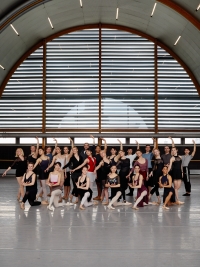
Soloists
Aleksandra Piotrowska-Zaręba, Douglas De Oliveira Ferreira, Grzegorz Pajdzik, Tomasz Sośnik,
Coryphées
Daniil Alexandrov, Ewa Czampiel-Matura, Artur Dmochowski, Michalina Drozdowska, Anna Kmiecik-Sokalla, Sylwia Kubacka-Werner, Monika Latusek, Ai Okuno, Karol Pluszczewicz , Aleksandra Pytel
Corps de ballet
Ellen Bremer, Sara Guarnieri, Viridiana Hernandez-Martinez, Mitsuki Noda, Keisuke Komori, Aleksandra Lach, Katarzyna Nalepa, Keisuke Sakai, Małgorzata Timofiejew, Raimundo Vicente Marco, Paweł Kranz, Patryk Nowacki, Krzysztof Szczygieł, Kurara Ushizaka
Collaborations
Students of The Ludomir Różycki Comprehensive Ballet School in Bytom
Ballet inspector
Ewa Czampiel-Matura
Ballet coaches
Kazimierz Cieśla, Lucyna Popławska
Ballet accompanist
Natalia Myślewicz